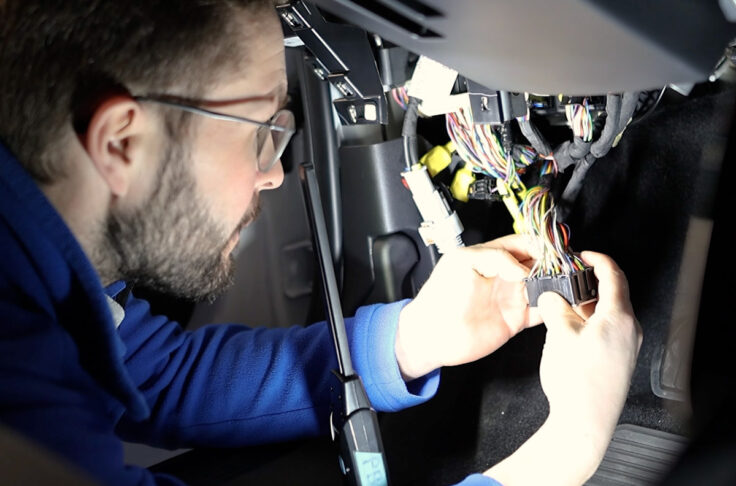
Shared Mobility 2022: 5 trends will shape the industry!

The future of mobility remains dynamic, and the Invers team expects further developments in 2022. Electromobility, autonomous driving, microcars, and innovative usage scenarios will offer convenient alternatives to vehicle ownership and will drive the market for shared mobility.
Siegen, December 28, 2021 – The mobility experts at Invers, the inventor of automated vehicle sharing, have identified five trends that will move the shared mobility industry in the coming year:
1. Vehicle data gains relevance
Data generated by vehicles is being used to enable autonomous driving, control infotainment and car comfort features, plan maintenance and analyze trips. This is not new; applications such as car sharing have been accessing vehicle data for some time. The data can be easily stored and pulled from the cloud. Therefore, questions around its use and ownership are increasingly attracting public interest. Current initiatives such as the EU’s Data Governance Act aim to regulate data sharing by private actors. At the same time, innovative solutions show how mobility can be improved through intelligent data use. For example, trip analyses can be used to reward environmentally friendly driving. Sharing applications enable mobility service providers to get greater use out of their fleets. Efficient vehicle life-cycle management based on specific usage data can further optimize resource utilization.
2. Car subscriptions attract additional market players
Car subscriptions in particular offer a convenient alternative to car ownership. Market players from various segments have discovered their potential for themselves. These include vehicle manufacturers such as VW; the ID.3 has been available on a subscription basis in Germany since September 2021. In addition, traditional rental providers are also entering the business. Europcar, for example, has announced that it will launch a subscription service in Norway. Also, car subscription startups continue to grow significantly. Munic-based Finn, for example, was able to raise 500 million Euros in December 2021 and continues to expand. The Chinese manufacturer Geely even offers a vehicle model under the Lynk&Co brand that is available exclusively in the subscription model.
3. Microcars experience a litmus test
Twizy, Microlino, City Transformer, Rocks-e – microcars are currently experiencing a revival. Unlike regular cars, they have been developed solely for urban mobility. Designed for the slower pace of city traffic with a level of comfort comparable to that of a car, while being lighter and less expensive. They combine the parking advantages of a two-wheeler with the transport possibilities of a car. As electric vehicles, they also promise sustainable, inner-city mobility. That’s a plus from the perspective of urban and transportation planners who have set Sustainable Urban Mobility (SUM) as their goal. Lower acquisition costs compared to bigger electric cars also make them attractive to sharing operators. There seems to be a favorable opportunity here, and there is one exciting question for 2022. Will microcars be able to increase their share in the urban mobility mix?
4. Campervan sharing grows and goes digital
Relaxed vacations in pandemic times? Many travel fans discovered RV vacations for themselves last year. According to a study by the U.S. industry association Go RVing, the number of RV travelers will rise from 56 million in 2021 to 65 million for the coming year. The reason for this is not only the pandemic-related desire to get away, but also trends spurred by the pandemic toward remote work, traveling in small groups, and vacationing in one’s own country. To facilitate this, rental companies want to offer their customers a convenient and fully digitized booking and takeover process. Therefore, the campervan is going digital; it can be booked online and picked up using a smartphone.
5. Cargo bikes inspire bike sharing
Cargo bikes relieve the burden on cities. They contribute to a change in traffic patterns and are currently developing into a lucrative business model. The market is experiencing a real boom, and the variety and size of the offerings are growing. A current study by the City Changer Cargo Bike project confirms this trend. It took a close look at the 38 most important providers in the European market and forecast growth of around 66 percent for 2021. The trend is also arriving in sharing: London, for example, has been testing cargo bike sharing in the east of the metropolis since September 2021.
In addition, logistics company Stuart Delivery and cargo bike manufacturer Vok Bikes have just announced plans to launch a cargo bike sharing service in London next year. According to industry association cargobike.jetzt, there are currently already around 150 providers of cargo bike sharing in Germany. It’s becoming a very dynamic market that is further spreading the idea of shared mobility.
Conclusion
Overall, it can be observed that the sharing trend is continuing and growing beyond the original model of community car sharing. New types of vehicles such as cargo bikes, campervans and microcars are being added. At the same time, new applications are expanding the original idea of shared mobility, such as when shared cargo bikes are used for delivery services or car subscriptions enable flexible, but long-term use of a vehicle similar to a rental.
About Invers
Invers, inventor of automated vehicle sharing, enables mobility service providers to launch, operate and scale their offerings with integrated hardware and software solutions specifically designed for developers of shared mobility services. As the world’s first shared mobility technology company, Invers is developing and reliably maintaining the fundamental building blocks at scale to offer its customers cost-efficient and easily implementable tech solutions.
The company acts as an independent and reliable partner for operators of services such as car sharing, scooter sharing, ride pooling and car rental with the vision to make the use of shared vehicles more convenient and affordable than ownership. Customers include Share Now, Clevershuttle, Miles, Getaround, Flinkster, TIER, Bounce and Emmy. The company was founded in 1993 and has locations in Siegen, Cologne and Vancouver. The development takes place entirely in Germany.


